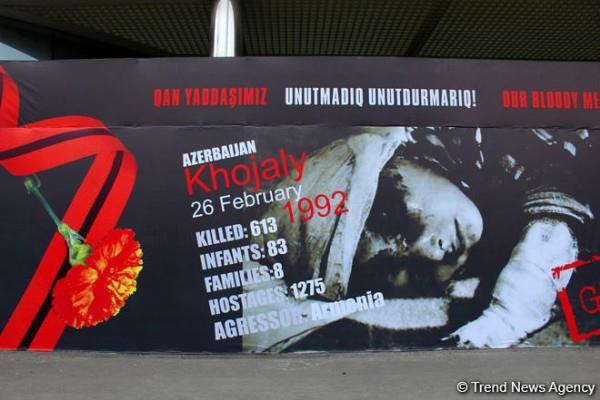
Khojaly Massacre is something that should never have happened
Speaking of history of Armenia's aggression towards Azerbaijan, Yevdayev reminded that the occupation continues, and the international community does nothing to make Armenia comply with international law.
He said that Feb. 26, 1992 events in Khojaly were much more than an act of occupation.
'What happened in Khojaly was a brutal massacre. Hundreds of totally innocent, unarmed Azerbaijanis were gunned down while fleeing the Armenian army. They were gunned down like animals in a field: men, women, and children,' Yevdayev said.
He added that as an Azerbaijani Jew, he feels especially sensitive about such an incident of inhumanity in modern time.
'It is hard to believe human beings were still capable of such atrocities, but as we know, even today, violence and cruelty ensues, in many countries around the world. We have such a responsibility to make good on that promise, and yet the world continues to challenge our commitment,' Yevdayev wrote.
Commenting on Israeli President Reuven Rivlin's speech at the UN General Assembly, where the head of state named Khojaly events among modern time genocides, Yevdayev said that Khojaly Massacre is something that should never have happened.
The author wrote about Azerbaijan-Israel relations being based on historical ties, 2,000-year old Mountainous Jewish community in Azerbaijan and roles of both countries for each another during different periods of history, such as Azerbaijanis fighting against Nazis and Azerbaijan being a safe haven for Jews during Holocaust, as well as Jews fighting for Azerbaijan's sovereignty in Karabakh war, Azerbaijan's National Hero of Jewish origin Albert Agarunov Among them.
'Thankfully, we have the support of great nations, such as the State of Israel, the United States and many others, to continue pushing Armenia to take responsibility and to leave the occupied Karabakh region; our land they so brutally took and still refuse to leave. I hope it will not be long from now that we have more to be thankful for, and that the story of Khojaly and the entire region will have a new chapter; one without occupiers, one that has the thousands of residents returning home, even after so many years,' Yevdayev concluded.
The conflict between the two South Caucasus countries began in 1988 when Armenia made territorial claims against Azerbaijan. As a result of the ensuing war, in 1992 Armenian armed forces occupied 20 percent of Azerbaijan, including the Nagorno-Karabakh region and seven surrounding districts.
On Feb. 25-26, 1992, the Armenian armed forces, together with the 366th infantry regiment of Soviet troops, stationed in Khankendi, committed an act of genocide against the population of the Azerbaijani town of Khojaly. As many as 613 people, including 63 children, 106 women and 70 old people were killed in the massacre. Eight families were totally exterminated, 130 children lost one parent and 25 children lost both. Some 1,275 innocent residents were taken hostage, while the fate of 150 people still remains unknown.
The 1994 ceasefire agreement was followed by peace negotiations. Armenia has not yet implemented four UN Security Council resolutions on withdrawal of its armed forces from the Nagorno-Karabakh and the surrounding districts.

Legal Disclaimer:
MENAFN provides the
information “as is” without warranty of any kind. We do not accept
any responsibility or liability for the accuracy, content, images,
videos, licenses, completeness, legality, or reliability of the information
contained in this article. If you have any complaints or copyright
issues related to this article, kindly contact the provider above.

















Comments
No comment